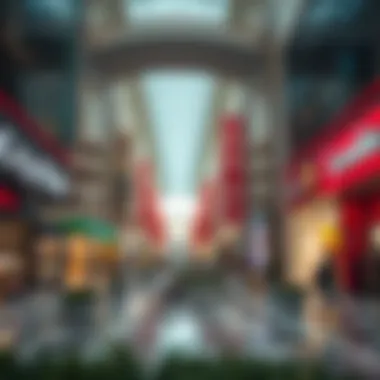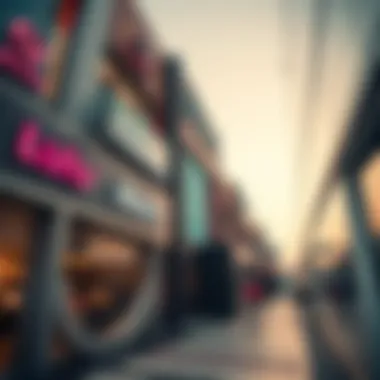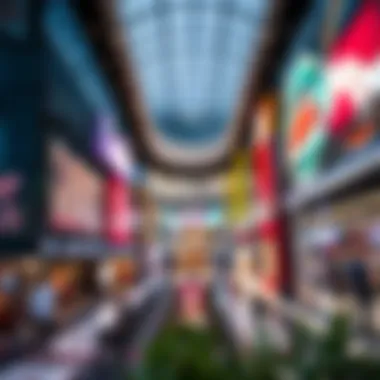Exploring the Dubai Mall and Lulu Hypermarket


Intro
Dubai, a city synonymous with luxury and extravagance, boasts not only stunning skyscrapers but also some of the most prominent shopping hubs in the world. Among these are the Dubai Mall and Lulu Hypermarket, two distinct venues that cater to various consumer needs while embodying the vibrant spirit of this metropolis. Understanding both places provides immense insights into the retail landscape of Dubai, revealing how cultural dynamics, consumer behavior, and economic factors intersect in this remarkable city.
In this article, we'll dissect these influential shopping destinations—exploring their unique features, cultural significance, and their impact on local and international shopping trends. By delving deep into the offerings of the Dubai Mall, known for its upscale shopping and entertainment options, alongside the comprehensive and community-focused approach of Lulu Hypermarket, we will chart how these venues not only serve as retail centers but also as cultural and social touchstones.
Through this exploration, readers will glean how these locations have shaped and continue to influence consumer habits in Dubai, making them essential stops for locals and expatriates alike. From market trends to future predictions, our journey will uncover the broader implications of shopping spaces in urban environments, especially within the context of a global city.
Let's dive into the intricate dynamics of these two landmarks, beginning with a thorough analysis of the current market trends surrounding them.
Foreword to Dubai's Retail Landscape
In the land of towering skyscrapers and opulent lifestyles, Dubai's retail landscape is a captivating tapestry woven with luxury, culture, and commerce. As the city flourished into a global hub, its shopping venues became not just places to buy goods, but vibrant cultural icons that reflect the aspirations of a diverse population. The significance of understanding this landscape is paramount, as it lays the groundwork for grasping the intricate roles played by institutions such as the Dubai Mall and Lulu Hypermarket in shaping consumer behavior and economic growth.
The Evolution of Retail in Dubai
From the early days of traditional souks, where traders bartered spices and textiles, to ultra-modern retail complexes, the evolution of retail in Dubai is a story of dramatic change and innovation. The advent of globalization introduced a plethora of international brands and shopping experiences, which, combined with local influences, created a unique retail environment that appeals to both residents and tourists alike.
In recent years, the rise of e-commerce has prompted brick-and-mortar stores to rethink their strategies. Many retail spaces began to incorporate technology, enhancing the in-store experience with interactive displays and virtual fitting rooms. This evolution signifies more than just convenience; it represents a cultural shift towards a consumer base that seeks everything from luxury to sustainability all under one roof. Amidst this dynamic shift, the Dubai Mall stands out as a paradigm of this retail transformation, offering a range of luxurious brands as well as local experiences that resonate with Emirati culture.
Significance of Dubai Mall and Lulu Hypermarket
When discussing the retail giants of Dubai, the Dubai Mall and Lulu Hypermarket naturally come to the forefront. Each serves a distinct purpose while complementing the retail ecosystem. The Dubai Mall, with its grand architecture and array of high-end shops, symbolizes luxury living and attracts millions of visitors each year. It’s not just a shopping venue; it’s a destination that features entertainment options, art exhibitions, and social spaces that draw various demographics, from affluent shoppers to families seeking a leisurely day out.
On the other hand, Lulu Hypermarket presents a more accessible shopping alternative, focusing on everyday needs with a local flair. It embodies the spirit of community and provides not only international brands but also regional products, catering to the multicultural fabric of Dubai. The hypermarket plays an essential role in the local economy by creating jobs and supporting local suppliers, thereby solidifying its significance.
Understanding the contrasting yet complementary nature of these shopping environments equips one to appreciate the complexities of consumer preferences and economic impacts within Dubai’s retail landscape. Their existence enriches not only the shopping experiences but also the cultural narrative of a city that continually evolves.
"Dubai's retail experience is not merely transactional; it's a journey that traverses cultures, making it a unique shopping haven."
Exploring these aspects of Dubai's retail landscape will offer valuable insights into how the city responds to the ever-changing dynamics of consumer behavior while positioning itself as a significant player on the global stage.
Overview of Dubai Mall
The Dubai Mall stands as a monumental achievement in the world of retail and leisure, setting a standard that many aspire to meet. It’s not just a shopping center; it’s a universe of experiences that attracts millions each year. The significance of this venue within Dubai’s vibrant landscape cannot be overstated, as it serves as a catalyst for economic growth, social interaction, and tourism.
The architectural grandeur of the mall is impressive, with its design blending modern aesthetics and traditional influences, providing an inviting atmosphere for visitors. It houses over 1,200 shops, 200 food and beverage outlets, and various entertainment options, making every visit unique. This diversity contributes to the mall's reputation as a key player in Dubai’s retail scene, perfectly catering to diverse consumer needs—from luxury brands to popular high street names.
The emphasis on a top-tier shopping experience is palpable, with exclusive promotions and events that keep visitors returning. The Dubai Mall harnesses cutting-edge technology, enhancing the way consumers interact with brands, paving the way for a seamless shopping adventure.
Architecture and Design
The design of Dubai Mall is nothing short of spectacular. Its vast expanse—covering over 1.1 million square meters—features a sleek, modern facade with features like escalators, lounges, and art installations. The centerpiece is the Dubai Aquarium, which is a true spectacle, offering an underwater experience rarely found in shopping venues.
The mall’s layout is meticulously designed to guide shoppers efficiently while still encouraging exploration. Featured artwork and installations add a layer of cultural enrichment to the experience, making it more than just a commercial space.
Key Attractions and Shopping Experience
Dubai Mall is replete with attractions that extend beyond mere shopping. Visitors can enjoy:
- The Dubai Ice Rink: A full-size ice skating rink that offers a refreshing break from shopping.
- VR Park: A virtual reality park that merges retail with cutting-edge technology, providing thrilling experiences.
- The Dubai Fountain: A mesmerizing water and light show performed daily, captivating onlookers.
This assortment of attractions enhances the shopping experience, ensuring it stays engaging and entertaining for all.
Dining and Entertainment Options
When it comes to dining, Dubai Mall boasts a plethora of options. Visitors can savor everything from gourmet dining experiences to casual bites. Notable mentions include:
- At.mosphere: Located on the 122nd floor of the Burj Khalifa, offering exquisite views.
- The Cheesecake Factory: Popular for its extensive menu and vibrant atmosphere.
- Street food stalls: Providing a taste of local flavors while shopping.
Additionally, entertainment venues like cinemas and live performances amplify the allure of the mall, making it a holistic destination for visitors.


Visitor Demographics and Trends
The demographics of the Dubai Mall’s visitors are diverse, encompassing tourists, residents, and expatriates. Recent trends indicate an increase in international tourists, particularly from Europe and Asia, due to Dubai's marketing as a premier shopping destination. This has opened doors for a unique customer base with specific shopping habits and preferences, influencing the retail strategies employed by the brands within the mall.
"The Dubai Mall reflects the dynamic spirit of the city itself—always evolving and adapting to meet the needs of its visitors."
In-Depth Look at Lulu Hypermarket
Lulu Hypermarket stands as a beacon of convenience and variety in Dubai’s bustling landscape. It’s not just a grocery store; it's a vital part of everyday life for many residents. Examining Lulu provides important insights into the retail habits that define the modern consumer. With a blend of local and international products, services, and an engaging shopping experience, Lulu caters to a diverse customer base. The hypermarket’s strategic location, often close to residential areas, also makes it an appealing destination for families seeking a one-stop shopping solution.
Product Range and Offerings
At Lulu Hypermarket, the product range is nothing short of impressive. From staple groceries to specialty items, the Hypermarket stocks everything you could think of. Here, you’ll find fresh produce gleaming with vitality, meats and fish that would make a chef proud, and a pantry stocked with local spices and condiments that reflect the rich culinary heritage of the area.
Key Offerings Include:
- Grocery Items: A comprehensive selection of fruits, vegetables, dairy products, and baked goods.
- Household Essentials: Cleaning supplies, kitchenware, and personal care products, catering to practical needs.
- Electronics: An array of gadgets, from laptops to kitchen appliances, meeting the tech cravings of modern consumers.
- Fashion Items: Seasonal clothing and accessories, targeting those hunting for deals.
Lulu doesn’t just stop at quantity. It emphasizes quality, often sourcing products from trusted local suppliers. Shoppers can often find organic options and premium brands alongside everyday items.
Culinary Delights: International and Local Brands
Food lovers will find Lulu Hypermarket a treasure trove of culinary delights, offering both local fare and exotic international brands. The gourmet section can whisk you away on a world tour through food.
- Local Specialties: Think traditional dates, an array of nuts, and sweets like baklava, which perfectly encapsulate Middle-Eastern flavors.
- International Foods: Here, you can discover brands from all over the globe, from Italian pasta to Japanese sauces, reflecting the multicultural makeup of Dubai.
- Ready-to-Eat Meals: Offering a variety of prepared foods from different cuisines, Lulu caters to those who may be too busy to cook.
This blend of local and international brands illustrates how Lulu understands its diverse customer base, striving to transform the shopping experience into a culinary journey.
Customer Experience and Services
Walking through the aisles of Lulu Hypermarket is an experience fueled by a commitment to customer satisfaction. Well-organized shelves and clear signage make navigation a breeze. More than just a store, it offers several services aimed at enhancing the shopping journey:
- Customer Service Centers: Ready to assist with inquiries and support, making problem-solving straightforward.
- Specialty Departments: From a bakery wafting the scent of fresh bread to a seafood counter brimming with the morning’s catch, department specialists enhance the shopping experience.
- Online Shopping Options: A convenient website allows customers to shop from the comfort of their home, and recent reviews suggest that delivery is often swift and reliable, accommodating busy lifestyles.
Beyond mere transactions, Lulu fosters a connection with its customers – through loyalty programs that reward repeat visits and seasonal promotions that engage the community.
Sustainability Initiatives and Community Engagement
Lulu Hypermarket understands the importance of social responsibility. In recent years, the hypermarket has initiated several sustainability practices aimed at minimizing its environmental footprint:
- Waste Reduction: Lulu has implemented programs to minimize food waste by donating unsold food to local charities.
- Eco-Friendly Packaging: The use of biodegradable bags and recyclable materials highlights their commitment to the environment.
- Community Events: Regularly hosted workshops and fairs support local artisans and farmers, weaving Lulu into the fabric of the community.
Engaging in initiatives that promote sustainability and community well-being not only enhances Lulu’s brand identity but also solidifies its cultural significance in Dubai.
Lulu Hypermarket is more than a shopping destination; it's a microcosm of Dubai's retail scene, highlighting the importance of variety, service, and responsibility in shaping consumer experiences.
Comparative Analysis of Dubai Mall and Lulu Hypermarket
A comparative analysis of the Dubai Mall and Lulu Hypermarket reveals key insights into their distinct roles within Dubai's vibrant retail landscape. While both establishments serve as shopping hubs, they cater to different segments of consumers and embody varying shopping experiences. Understanding their differences and similarities holds significant implications for investors and stakeholders in the retail sector.
Target Audience and Market Segmentation
When it comes to target audience, the Dubai Mall appeals to a high-end clientele, including tourists and affluent locals. It’s a place where luxury brands showcase the latest fashion trends, and shoppers expect an experience that goes beyond mere purchases. For instance, the mall features high-end stores like Gucci and Louis Vuitton, making it a paradise for luxury shoppers.
On the other hand, Lulu Hypermarket caters to a more diverse demographic, focusing on families and everyday shoppers. It offers a wide array of products at competitive prices, making it a go-to destination for grocery shopping and household essentials. Customers range from expatriates to locals who seek variety and affordability in their purchases.
"The Dubai Mall is where dreams are made, while Lulu Hypermarket is where families shop for their daily needs."
Shopping Habits and Consumer Preferences
Consumer preferences play a crucial role in shaping shopping habits in these two venues. Dubai Mall shoppers often seek unique, high-quality items and are willing to spend more for exclusivity. They enjoy browsing through boutique stores and may prioritize an immersive shopping experience, which includes upscale dining options and entertainment.


Conversely, shoppers at Lulu Hypermarket tend to prioritize value for money and convenience. They often make quick trips to grab essential goods, looking for sales or discounts. The hypermarket's layout is designed for efficient shopping, allowing customers to navigate quickly through grocery aisles and sections with ease.
Financial Impact on Dubai’s Economy
Both the Dubai Mall and Lulu Hypermarket contribute significantly to the economy, albeit in different ways. The Dubai Mall, with its vast array of luxury shops and attractions, drives a considerable amount of tourism-related revenue. Its extravagant shopping experience not only boosts sales tax revenues but also supports the hospitality sector. Tourists flock to the mall, contributing to the overall economic vibrancy of Dubai.
In contrast, Lulu Hypermarket anchors local communities by providing affordable shopping options, which is crucial for lower and middle-income families. Its presence helps stimulate job creation—both directly, through employment within the hypermarket, and indirectly, through supply chain operations. Thus, while the economic contributions of these two retailers differ, both play a vital part in the diverse fabric of Dubai’s commercial landscape.
In summary, while the Dubai Mall and Lulu Hypermarket occupy the same geographical space, they serve distinctly different purposes, embodying the dynamic nature of Dubai's retail industry. Recognizing this distinction allows businesses and investors to tailor their strategies effectively to target the right audience.
The Role of Technology in Shaping Consumer Experience
In today’s rapidly changing retail environment, technology plays a pivotal role in shaping consumer experiences. As markets evolve and consumer demands shift, the integration of innovative technologies within venues like the Dubai Mall and Lulu Hypermarket enhances not only shopping convenience but also enriches the overall shopping journey.
Benefits of Embracing Technology:
A few key benefits of using technology in retail include:
- Improved Customer Engagement: Engaging consumers with interactive screens, mobile applications, and virtual reality can create a more immersive shopping experience. This is particularly evident in the Dubai Mall, where augmented reality contributes to various attractions.
- Personalization: Retailers can analyze consumer data to tailor marketing strategies, suggest products, and enhance customer loyalty through personalized recommendations. It makes every visit a little bit more special.
- Enhanced Accessibility: Technology such as mobile payment options and online shopping platforms allows customers to enjoy seamless shopping experiences, whether in-store or online. Lulu Hypermarket offers a user-friendly app for online grocery shopping for this very reason.
However, this reliance on technology brings considerations, such as adapting to the needs of all customers, from tech-savvy millennials to older generations who might be less familiar with smartphones or online platforms.
E-commerce Integration and Future Trends
The shift towards e-commerce has seen retailers like Lulu Hypermarket increasingly optimize their operations to cater to online shoppers. E-commerce offers customers the ability to shop from home, a convenience that has become essential in recent times.
- Omni-channel Strategies: Retailers are no longer just physical locations; they are merging online activities with in-store experiences. This lets customers navigate seamlessly between platforms, helping them pick up groceries at Lulu after placing an order online, thus saving time.
- Personalized Shopping: Future e-commerce trends suggest a stronger focus on AI-driven recommendations. As customers engage digitally, retailers will leverage algorithms to suggest products that meet their past preferences.
The role of social media as a sales channel is also taking center stage. Platforms like Instagram and Facebook are becoming places where consumers make purchases directly, reshaping traditional marketing methods and broadening retail horizons.
Innovations in Retail Technology
Retail technology is evolving at an unprecedented pace, leading to innovations that redefine consumer interactions. Some notable advancements are:
- Smart Carts: These offer functionalities like automatic scanning to tally items in real-time, improving efficiency while shopping at Lulu Hypermarket.
- Contactless Payments: Retailers are adopting secure and fast payment solutions, making transactions easier for shoppers. This trend not only speeds up the checkout process but enhances safety.
- VR Shopping Experiences: In places like the Dubai Mall, virtual reality shops allow consumers to try on clothing or experience products in a digitally simulated environment.
"The future of retail is not just in selling products, but in creating memorable shopping experiences that resonate with consumers on multiple levels."
With advancements like these, the retail landscape is primed for a transformation that will continue evolving.
By harnessing these technologies effectively, retail establishments ensure they capture consumer interest while building loyalty—critical factors in the ongoing competition for market dominance in a vibrant city like Dubai.
Cultural Significance of Shopping Venues in Dubai
The impact of shopping venues in Dubai stretches far beyond mere transactional spaces; they are cornerstones of cultural interaction and community connection. This section delves deep into the significance of shopping venues like the Dubai Mall and Lulu Hypermarket, exploring their role in shaping social dynamics, tourism, and the local economy.
Shopping Festivals and Tourism
Shopping festivals in Dubai have become synonymous with the city's vibrant retail scene, attracting millions of tourists from all around the globe. Events like the Dubai Shopping Festival transform the already bustling city into a sparkling spectacle of lights, sales, and entertainment. These festivals are not just about discounts; they are cultural showcases that integrate art, food, and fashion, giving visitors a taste of local traditions intertwined with global flair. The remarkable influx of tourists during these periods boosts the economy significantly, promoting both local and international businesses within shopping venues.
- "Dubai is a melting pot of cultures, with shopping festivals inviting people to indulge in cultural exchanges while shopping."
Additionally, the shopping festivals elevate the importance of venues like Dubai Mall and Lulu Hypermarket as essential elements of the city’s identity. For visitors, these malls often serve as the first point of contact with Dubai’s cultures; they experience a mix of international products and local offerings, along with unique experiences such as food tastings and cultural performances. The ambiance and energy during such events create an environment where shopping transcends into a celebratory experience.
The Experience of Luxury Shopping in Dubai
Indeed, luxury shopping in Dubai does not simply mean high-end brands but rather an experience that encapsulates exclusivity, opulence, and customer-centric service. Locations like the Dubai Mall boast flagship stores from world-famous brands such as Louis Vuitton, Chanel, and Gucci. However, it’s not just about the price tags; these venues curate an environment where customer service is paramount, ensuring every shopper feels valued. The personal stylists, bespoke tailoring services, and luxurious boutiques redefine the very essence of retail shopping.
Shoppers are not only purchasing items but also investing in an experience. Many high-net-worth individuals or expatriates seek out Dubai for its unparalleled shopping environment; the glittering displays and personalized services may well justify the investment.
- Key Elements Influencing Luxury Shopping Experience:


- Exclusive product lines
- Personalized shopping assistance
- Private showcases and events
The attraction of luxury shopping experiences extends beyond residents to include tourists eager for an unforgettable experience. They often leave with not just luxury goods, but stories to tell and cherished memories, further embedding shopping in Dubai's culture. As such, these venues play a vital role in luxury tourism, solidifying Dubai's reputation as a premier shopping destination globally.
Challenges Facing Retail in Dubai
The retail sector in Dubai showcases a dazzling facade, marked by stunning stores and luxurious shopping destinations. Beneath this veneer, however, lies a complex web of challenges that retailers must contend with. Understanding these obstacles is crucial, not just for business owners, but also for investors and consumers who are navigating this vibrant market. The retail environment in Dubai is continually influenced by a range of economic factors, consumer behavior trends, and competitive dynamics.
Impact of Economic Fluctuations
Economic fluctuations play a pivotal role in shaping the retail landscape of Dubai. The city's economy is heavily reliant on tourism and international trade, both of which are susceptible to changes in the global economic climate.
When economic downturns strike, consumer spending usually takes a hit. This is particularly relevant for luxury retail outlets, which rely on high disposable income. In recent years, Dubai has faced economic pressures due to various external factors, including geopolitical tensions and the rising cost of living. These issues can lead to erratic consumer behavior, where shoppers become more cautious with their expenditures. The once-thriving high-ticket sales begin to stall, compelling retailers to rethink their pricing strategies.
Retailers are now increasingly embracing discount strategies and promotional offers to lure back hesitant buyers. This shift could ultimately affect profit margins, forcing businesses to reconsider their operating models and diversify their offerings. For instance, we see brands such as Carrefour or Spinneys adapting tactics to capture market share by emphasizing affordable products alongside luxury items.
It is essential, then, for retailers to keep a keen eye on macroeconomic indicators while remaining adaptable to market shifts. This flexibility may prove vital to surviving and thriving amidst these fluctuations.
Identifying Trends and Consumer Behavior Shifts
Another major challenge in Dubai's retail sector is keeping pace with evolving trends and consumer behaviors. The preferences of consumers today are no longer static; rather, they continue to shift influenced by a mesh of cultural and social factors.
For instance, millennials and Generation Z are now at the helm of the consumer market, and their shopping patterns differ immensely from those of previous generations. They favor experiences over mere products, emphasizing personalized shopping adventures. This gives rise to a growing focus on experiential retail, which blends shopping with entertainment and dining options. The Dubai Mall exemplifies this shift with its array of attractions beyond conventional shopping.
Additionally, the pandemic had a seismic impact on buyer behavior, turbocharging the shift toward online shopping and contactless delivery options. While e-commerce gains momentum, understanding its effects on traditional retail spaces has become critical. Incorporating technology into the shopping experience is one way retailers can remain relevant. For example, many have begun utilizing augmented reality to enhance in-store experiences, drawing customers into their stores despite online competition.
Online reviews and social media influence play a significant role as well. Consumers now rely heavily on peer feedback before making purchases, leading to a greater demand for transparency and authenticity. Retail businesses must stay alert and agile to not only capture existing trends but also to anticipate future shifts before they become gaps that competitors may exploit.
As retail continues to evolve, recognizing these trends will ensure businesses can adapt and cater to the shifting desires of Dubai's diverse consumer base.
"The key to survival in the retail landscape is not just to keep up, but to stay ahead of the curve, always listening and learning from the market."
In summary, the challenges facing retail in Dubai can be extreme yet navigable with foresight and adaptability. Economic fluctuations and consumer behavior shifts demand that retailers invest in strategic measures, thus enabling not only survival but potential growth in a competitive market.
Future Outlook for Retail in Dubai
The future of retail in Dubai is brimming with opportunities and challenges, making it a focal point for real estate agents, investors, expatriates, homeowners, and developers. With a growing population and a steady influx of tourists, the retail sector is expected to remain vibrant. This section will explore the elements driving this dynamic landscape, focusing on potential developments and the rising trend of mixed-use developments.
Potential Developments in Retail Spaces
Dubai's retail scene is not static; it's evolving rapidly. New malls and retail spaces are not just buildings; they represent investments in community and culture. The future will likely see:
- Experiential Shopping: Retailers will shift focus toward attracting consumers through experiences rather than mere transactions. Think of retailers engaging customers in immersive environments that tell a story or provide unique interactions.
- Sustainable Design: Expect future developments to prioritize eco-friendly materials and practices. Developers might incorporate green roofs, solar panels, and energy-efficient systems, reducing dependencies on conventional power sources.
- Technological Integration: The adolescence of smart retail. As technology advances, expect the introduction of augmented reality and mobile payments. Shoppers could walk into stores and receive tailored promotions based on their preferences.
- Community-Centric Spaces: There’s an inclination towards creating spaces that foster community interaction. Retail spaces may evolve into multi-functional venues serving as markets during the day and restaurants at night.
The Rise of Mixed-Use Developments
Mixed-use developments are on the rise, merging residential, commercial, and recreational spaces. This not only enhances convenience for residents but creates bustling neighborhoods.
- Walkability: These developments often advocate for pedestrian-friendly designs. Imagine a groomed path that leads from a vibrant marketplace to nearby parks, fostering connections among residents and visitors.
- Diverse Offerings: A mixed-use space might feature retail shops on the ground floor, with restaurants above, and luxury apartments or offices on the upper floors. Such arrangements invite a variety of consumers and cater to different demographics.
- Community Engagement: By incorporating spaces for community events, these developments encourage local engagement. They often host farmers' markets or cultural events, blending commercial and social elements seamlessly.
- Investment Potential: Real estate investors should take note. The demand for multi-purpose spaces indicates a surge in investment opportunities. Developers focusing on these trends could see considerable returns, given the trend toward urban living in Dubai.
Ending
In wrapping up this comprehensive overview, it’s clear that both the Dubai Mall and Lulu Hypermarket play pivotal roles within the vibrant retail landscape of Dubai. Their contributions transcend mere shopping; they encapsulate cultural and economic narratives that define the essence of modern Dubai.
Recap of Key Insights
- Dubai Mall is not just a shopping hub but a lifestyle destination that combines entertainment, dining, and luxury retail in an architecturally stunning environment. From the mesmerizing fountain shows to the vast array of global brand offerings, it draws millions of visitors each year.
- Lulu Hypermarket, on the other hand, serves a different but equally significant purpose. Its focus on groceries and daily consumer goods provides invaluable accessibility for residents, catering to diverse needs from household essentials to specialized food items.
- Both establishments attract a diverse demographic, from tourists seeking unique experiences to locals looking for convenience and variety in shopping.
- The architectural brilliance of the Dubai Mall and the practical layout of Lulu Hypermarket highlight the duality of luxury and everyday accessibility in Dubai's retail strategy.
This synthesis of insights underscores how these venues reflect broader economic trends in the region, showcasing Dubai's ambition to be a leader in retail and tourism on a global scale. They are not merely places to shop but environments where cultural exchange occurs and community engagement flourishes.
Implications for Investors and Consumers
For investors, understanding the dynamics at play in these shopping destinations carries substantial implications. The high foot traffic of Dubai Mall represents opportunities for brands looking to reach a wealthy, diverse customer base. The luxury segment continues to thrive here, thanks to both local and international clientele. In contrast, the steady demand for essentials at Lulu Hypermarket signals a stable market for day-to-day consumer goods, indicative of a resilient retail sector.
Consumers benefit from this vibrant retail ecosystem, enjoying an unparalleled shopping experience that melds luxury and convenience. The availability of global brands alongside local offerings allows for a richer shopping experience, catering to varied preferences and fostering inclusivity. Both venues thus enhance not only the economic landscape but also the social fabric of the city, uniting residents and visitors alike through shared shopping experiences.
As we look to the future, the evolution of these shopping spaces will likely shape retail trends in Dubai and beyond, offering invaluable insights for stakeholders in this fast-paced environment. In a city known for its innovation and growth, the potential for continued expansion and transformation in retail remains vast.











